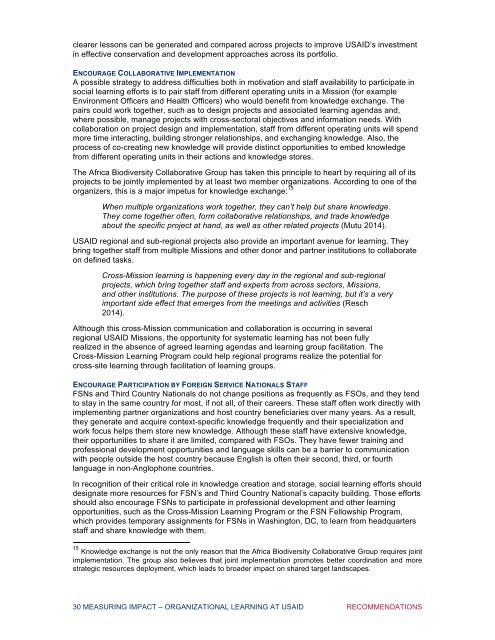MEASURING IMPACT Making Use of the Portfolio Organizational Learning at USAID
28Mzh2D
28Mzh2D
Create successful ePaper yourself
Turn your PDF publications into a flip-book with our unique Google optimized e-Paper software.
clearer lessons can be gener<strong>at</strong>ed and compared across projects to improve <strong>USAID</strong>’s investment<br />
in effective conserv<strong>at</strong>ion and development approaches across its portfolio.<br />
ENCOURAGE COLLABORATIVE IMPLEMENTATION<br />
A possible str<strong>at</strong>egy to address difficulties both in motiv<strong>at</strong>ion and staff availability to particip<strong>at</strong>e in<br />
social learning efforts is to pair staff from different oper<strong>at</strong>ing units in a Mission (for example<br />
Environment Officers and Health Officers) who would benefit from knowledge exchange. The<br />
pairs could work toge<strong>the</strong>r, such as to design projects and associ<strong>at</strong>ed learning agendas and,<br />
where possible, manage projects with cross-sectoral objectives and inform<strong>at</strong>ion needs. With<br />
collabor<strong>at</strong>ion on project design and implement<strong>at</strong>ion, staff from different oper<strong>at</strong>ing units will spend<br />
more time interacting, building stronger rel<strong>at</strong>ionships, and exchanging knowledge. Also, <strong>the</strong><br />
process <strong>of</strong> co-cre<strong>at</strong>ing new knowledge will provide distinct opportunities to embed knowledge<br />
from different oper<strong>at</strong>ing units in <strong>the</strong>ir actions and knowledge stores.<br />
The Africa Biodiversity Collabor<strong>at</strong>ive Group has taken this principle to heart by requiring all <strong>of</strong> its<br />
projects to be jointly implemented by <strong>at</strong> least two member organiz<strong>at</strong>ions. According to one <strong>of</strong> <strong>the</strong><br />
organizers, this is a major impetus for knowledge exchange: 15<br />
When multiple organiz<strong>at</strong>ions work toge<strong>the</strong>r, <strong>the</strong>y can’t help but share knowledge.<br />
They come toge<strong>the</strong>r <strong>of</strong>ten, form collabor<strong>at</strong>ive rel<strong>at</strong>ionships, and trade knowledge<br />
about <strong>the</strong> specific project <strong>at</strong> hand, as well as o<strong>the</strong>r rel<strong>at</strong>ed projects (Mutu 2014).<br />
<strong>USAID</strong> regional and sub-regional projects also provide an important avenue for learning. They<br />
bring toge<strong>the</strong>r staff from multiple Missions and o<strong>the</strong>r donor and partner institutions to collabor<strong>at</strong>e<br />
on defined tasks.<br />
Cross-Mission learning is happening every day in <strong>the</strong> regional and sub-regional<br />
projects, which bring toge<strong>the</strong>r staff and experts from across sectors, Missions,<br />
and o<strong>the</strong>r institutions. The purpose <strong>of</strong> <strong>the</strong>se projects is not learning, but it’s a very<br />
important side effect th<strong>at</strong> emerges from <strong>the</strong> meetings and activities (Resch<br />
2014).<br />
Although this cross-Mission communic<strong>at</strong>ion and collabor<strong>at</strong>ion is occurring in several<br />
regional <strong>USAID</strong> Missions, <strong>the</strong> opportunity for system<strong>at</strong>ic learning has not been fully<br />
realized in <strong>the</strong> absence <strong>of</strong> agreed learning agendas and learning group facilit<strong>at</strong>ion. The<br />
Cross-Mission <strong>Learning</strong> Program could help regional programs realize <strong>the</strong> potential for<br />
cross-site learning through facilit<strong>at</strong>ion <strong>of</strong> learning groups.<br />
ENCOURAGE PARTICIPATION BY FOREIGN SERVICE NATIONALS STAFF<br />
FSNs and Third Country N<strong>at</strong>ionals do not change positions as frequently as FSOs, and <strong>the</strong>y tend<br />
to stay in <strong>the</strong> same country for most, if not all, <strong>of</strong> <strong>the</strong>ir careers. These staff <strong>of</strong>ten work directly with<br />
implementing partner organiz<strong>at</strong>ions and host country beneficiaries over many years. As a result,<br />
<strong>the</strong>y gener<strong>at</strong>e and acquire context-specific knowledge frequently and <strong>the</strong>ir specializ<strong>at</strong>ion and<br />
work focus helps <strong>the</strong>m store new knowledge. Although <strong>the</strong>se staff have extensive knowledge,<br />
<strong>the</strong>ir opportunities to share it are limited, compared with FSOs. They have fewer training and<br />
pr<strong>of</strong>essional development opportunities and language skills can be a barrier to communic<strong>at</strong>ion<br />
with people outside <strong>the</strong> host country because English is <strong>of</strong>ten <strong>the</strong>ir second, third, or fourth<br />
language in non-Anglophone countries.<br />
In recognition <strong>of</strong> <strong>the</strong>ir critical role in knowledge cre<strong>at</strong>ion and storage, social learning efforts should<br />
design<strong>at</strong>e more resources for FSN’s and Third Country N<strong>at</strong>ional’s capacity building. Those efforts<br />
should also encourage FSNs to particip<strong>at</strong>e in pr<strong>of</strong>essional development and o<strong>the</strong>r learning<br />
opportunities, such as <strong>the</strong> Cross-Mission <strong>Learning</strong> Program or <strong>the</strong> FSN Fellowship Program,<br />
which provides temporary assignments for FSNs in Washington, DC, to learn from headquarters<br />
staff and share knowledge with <strong>the</strong>m.<br />
15 Knowledge exchange is not <strong>the</strong> only reason th<strong>at</strong> <strong>the</strong> Africa Biodiversity Collabor<strong>at</strong>ive Group requires joint<br />
implement<strong>at</strong>ion. The group also believes th<strong>at</strong> joint implement<strong>at</strong>ion promotes better coordin<strong>at</strong>ion and more<br />
str<strong>at</strong>egic resources deployment, which leads to broader impact on shared target landscapes.<br />
30 <strong>MEASURING</strong> <strong>IMPACT</strong> – ORGANIZATIONAL LEARNING AT <strong>USAID</strong> RECOMMENDATIONS


